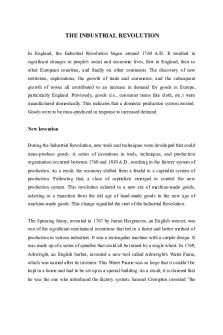Tutorial Guided Notes for Industrial Revolution PDF

| Title | Tutorial Guided Notes for Industrial Revolution |
|---|---|
| Author | Zahra Tall |
| Course | Honors U.S. History |
| Institution | Stephen F. Austin State University |
| Pages | 3 |
| File Size | 53.6 KB |
| File Type | |
| Total Downloads | 79 |
| Total Views | 121 |
Summary
U.s honor United States Notes and assignement great work please view good answers about the Industrial rev...
Description
First Industrial Revolution Date- 1790 - 1840
Second industrial revolution Date-1870 - 1914
Location- America
Location- America
Technology-Textiles , Power loom , cotton gin , steam power beginning
Technology- Machinery , mass production, assembly line , growth in telegraph lines , telephone,1876 , Edison’s light bulb,1879 , Manufacturing powerhouses , World leading manufacturer 1894
PeopleSamuel Morse People- Thomas Edison, Graham Bell Effects on People Rise of factories and work. More transportation Effects on People- Mass production of machinery, railroads Use the following link to answer the guided notes for the tutorial. Please using a different font color then black. https://www.cpalms.org/Public/PreviewResourceStudentTutorial/Preview/151510 Gilded agePolitical corruption, corporate greed, 1865 - 1900 Who were the Captains of Industry? Robber barons What grew from 20-40,000? The number of millionaires How did government react to these captains? No government oversight or regulation of business Who was John D. Rockefeller? He was a captain of industry What is he known for?
He was known for owning the world’s first and largest multinational corporation of oil.
Horizontal Integration- One Company buys out or takes over others in the same industry, become one big company, 1879: standard oil controlled 90% of oil refining in the U.S.
Vertical Integration- One Company owns everything in its supply chain, Oil barrels pipelines railroads cars oil storages facilities
Trust- Combination of firms or corporations for the purpose of reducing competition and controlling prices throughout a business or industry
Monopoly- Complete ownership or control of all goods or services in a certain market .
Holding Company- Corporation that owns enough voting stock in one more companies to exercice control over them.
Andrew Carnegie- Captain of steel industry
J.P. Morgan- Captain of industry, finance industries, one of the most powerful investment bankers
Edison- light bulb man
Steel- used for construction, automobiles and railroads
What did railroads do for the economy?
Cornelius Vanderbilt- Started in steamship and shipping industry , 1860s transitioned to railroad industry built the New York Central Railroad
Jay Gould- Rivals with Vanderbit, Prince of the robber barons, cosmetic improvements only sold at profit
What are two true statements about railroads? Vanderbilt consolidated several railroads into one of America’s first giant corporations. The development of railroads helped spur growth in the American economy. Granville T. Woods- Granville T. woods was a prolific inventor during the second industrial revelation
George Pullman- frequently traveled on railroads in pursuit of business, but he disliked the experience.
Elijah McCoy- Worked as a fireman and oiler for the Michigan Central Railroads and through his work on the railroad he invented an automatic lubricator for oiling steam engines on trains.
George Westinghouse-as a young man Westinghouse witnessed a train wreck where the two engineers saw one another, but were unable to stop their trains in time using the existing brakes.
Henry Flagler- Partner in standard oil, decided to focus on Florida...
Similar Free PDFs

Industrial Revolution
- 2 Pages

Industrial Revolution
- 19 Pages

THE Industrial Revolution
- 4 Pages

Industrial Revolution in Canada
- 5 Pages

Industrial Revolution Essay
- 9 Pages

Industrial Revolution DBQ
- 8 Pages

Video-CC-Industrial Revolution
- 2 Pages

The third industrial revolution
- 2 Pages
Popular Institutions
- Tinajero National High School - Annex
- Politeknik Caltex Riau
- Yokohama City University
- SGT University
- University of Al-Qadisiyah
- Divine Word College of Vigan
- Techniek College Rotterdam
- Universidade de Santiago
- Universiti Teknologi MARA Cawangan Johor Kampus Pasir Gudang
- Poltekkes Kemenkes Yogyakarta
- Baguio City National High School
- Colegio san marcos
- preparatoria uno
- Centro de Bachillerato Tecnológico Industrial y de Servicios No. 107
- Dalian Maritime University
- Quang Trung Secondary School
- Colegio Tecnológico en Informática
- Corporación Regional de Educación Superior
- Grupo CEDVA
- Dar Al Uloom University
- Centro de Estudios Preuniversitarios de la Universidad Nacional de Ingeniería
- 上智大学
- Aakash International School, Nuna Majara
- San Felipe Neri Catholic School
- Kang Chiao International School - New Taipei City
- Misamis Occidental National High School
- Institución Educativa Escuela Normal Juan Ladrilleros
- Kolehiyo ng Pantukan
- Batanes State College
- Instituto Continental
- Sekolah Menengah Kejuruan Kesehatan Kaltara (Tarakan)
- Colegio de La Inmaculada Concepcion - Cebu







